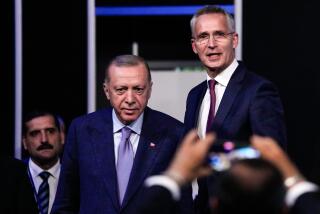When a name won’t fit on the tip of a tongue
- Share via
UNITED NATIONS — As leaders of 192 nations gather at the United Nations this week, there is one question on nearly everyone’s mind: How do you say that name?
To begin with, there is Iran’s president, Mahmoud Ahmadinejad (ahh-mah-dee-nee-ZHAHD, according to the Voice of America, https://names.voa.gov), who captured headlines during his visit to New York this week. His multisyllabic name has bedeviled broadcasters and other world leaders since he was elected president two years ago.
Some have come up with memory aids to keep the name on the tip of their tongue when they are on the air.
“I’m a dinner jacket,” said Nathan King, the U.N. correspondent of South African Broadcasting, who notes it works best with a British accent.
It is easiest to remember if you think of it as its original two names: Ahmadi, and Nejad, which together could mean “born of the believers of Ahmad.”
“It’s just two names, put together,” said a staffer at the Iranian mission, who did not want to give his name. “It doesn’t have a special meaning.”
For his address at the General Assembly, President Bush was not taking any chances. His speechwriters put phonetic guides into his speech, so that the leader of Zimbabwe, Robert Mugabe (moo-Gah-bee), would understand he was being told to stop the crackdown in Harare [hah-RAR-ray]. Bush didn’t talk about Ahmadinejad because the Iranian president had gotten enough attention, not because Bush couldn’t pronounce the name, an aide said.
But when Bush announced new sanctions on the military regime in Myanmar, he purposely used its pre-overthrow name, Burma, signaling that the United States does not recognize the current government. The delegate from Myanmar called a point of order to object.
The president of the General Assembly, who is Macedonian, got a double taste of name trouble Tuesday. Srgjan Kerim introduced his president as being from the “Republic of Macedonia,” although that name is disputed by Greece, and the new country is officially known as the Former Yugoslav Republic of Macedonia, or FYROM (pronounced officially as FY-rom).
Greece protested, saying that Kerim disrespected the institution over which he is presiding by not using the U.N.-sanctioned name. Kerim said, “I am a citizen of the state of Macedonia, so I decided to abide by my constitution and call it what we call it.”
Names are important to Kerim, who has to introduce each of the 192 speakers during the eight-day General Assembly meeting. He studies each slate of delegates to make sure he makes no mistakes, and rolls right through tongue twisters such as Gurbanguly Berdymukhammedov of Turkmenistan and Martin Nduwimana of Burundi.
“I wouldn’t want to pronounce a name in a funny way, because I have been a victim of this many times myself,” he said. His name, Srgjan [SIR-jan], confuses people because it seems to be missing a vowel, he says. People have called him sergeant, surgeon and Sir John, he said. “But I don’t even notice it anymore when people mispronounce it.”
When Secretary-General Ban Ki-moon first took the U.N.’s top post in January, he gave reporters a pronunciation lesson. Ban is his last name, though it comes first, and it is said “Ban as in autobahn.” His given name sounds like “GEE-moo.” A formal man, Ban is usually slightly taken aback when people call him Ki-moon.
So aides braced for the first time he met President Bush, who has a well-known fondness for nicknames.
So what does Bush call him?
“Secretary-General.”
--
More to Read
Sign up for Essential California
The most important California stories and recommendations in your inbox every morning.
You may occasionally receive promotional content from the Los Angeles Times.










